
CHEMICAL RESEARCH IN CHINESE UNIVERSITIES
Scope & Guideline
Navigating the Landscape of Chemistry Research
Introduction
Aims and Scopes
- Materials Chemistry:
Research related to the design, synthesis, and application of new materials, including nanomaterials, metal-organic frameworks (MOFs), and composites, with a focus on their chemical properties and applications in energy storage, catalysis, and sensors. - Electrochemistry and Energy Storage:
Investigations into electrochemical processes and the development of advanced materials for batteries, supercapacitors, and fuel cells, addressing challenges in energy efficiency and sustainability. - Nanotechnology and Nanomaterials:
The exploration of nanoscale materials and their unique properties, including their application in biomedical fields, environmental remediation, and as catalysts in chemical reactions. - Environmental Chemistry:
Studies focusing on the detection, analysis, and degradation of pollutants, including emerging contaminants in water and air, with a goal of developing sustainable methods for environmental protection. - Medicinal Chemistry and Drug Development:
The synthesis and evaluation of new pharmaceutical compounds, including the investigation of their mechanisms of action and therapeutic applications, particularly in cancer treatment and disease prevention. - Analytical Chemistry:
Development of novel analytical methods and sensors for the detection and quantification of chemical species in various matrices, emphasizing advancements in bioanalytical techniques.
Trending and Emerging
- Sustainable Chemistry and Green Technology:
There is a marked increase in research focused on sustainable practices, green solvents, and eco-friendly synthesis methods, driven by global environmental concerns. - Advanced Energy Materials:
Emerging studies on new materials for energy conversion and storage, including lithium-sulfur batteries and supercapacitors, highlight a trend towards addressing energy sustainability. - Biotechnology and Medicinal Chemistry:
Research at the intersection of chemistry and biology, particularly in drug design and development, is gaining traction, reflecting an increasing interest in therapeutic innovations. - Smart Materials and Functional Polymers:
The development of smart materials that respond to environmental stimuli and their applications in sensors and actuators is becoming a significant focus area. - Nanomedicine and Drug Delivery Systems:
Research on the application of nanotechnology in medicine, particularly for targeted drug delivery and imaging, is rapidly expanding, indicating a shift towards personalized medicine. - Artificial Intelligence in Chemistry:
The integration of AI and machine learning in chemical research for predictive modeling and data analysis is an emerging theme, showcasing the influence of computational methods on traditional chemistry.
Declining or Waning
- Traditional Organic Synthesis:
Research papers focusing on conventional organic synthesis methods have decreased, possibly due to the rise of more innovative and efficient synthetic methodologies such as green chemistry and biocatalysis. - Inorganic Chemistry:
The volume of studies dedicated to purely inorganic chemistry has waned, as interdisciplinary approaches and hybrid materials are becoming more prevalent, reflecting a broader integration of disciplines. - Basic Theoretical Chemistry:
Theoretical studies that do not directly apply to practical applications are less frequently published, suggesting a shift towards more applied research that addresses real-world problems. - Classical Polymer Chemistry:
Research focusing solely on classical polymerization techniques has diminished, as newer methods such as controlled/living polymerization and the development of functional polymers gain more attention. - Surface Chemistry:
Research specifically centered on surface chemistry has seen a decline, as the integration of surface studies into larger frameworks of material science and nanotechnology becomes more common.
Similar Journals
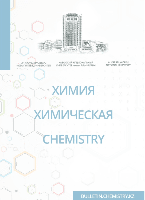
Chemical Bulletin of Kazakh National University
Advancing Chemistry through Open Access InnovationThe Chemical Bulletin of Kazakh National University is a prominent open-access journal dedicated to advancing the field of chemistry. Published by AL-FARABI KAZAKH NATIONAL UNIVERSITY, this journal serves as a vital platform for disseminating original research, reviews, and innovative findings in diverse areas of chemistry since its transition to open access in 2012. With an ISSN of 1563-0331 and an E-ISSN of 2312-7554, the journal aims to reach a global audience, fostering knowledge exchange among researchers, professionals, and students in the scientific community. The publication seeks to promote high-quality research that contributes to the understanding and application of chemical sciences, particularly in the context of Kazakhstan and the broader Central Asian region. Given the journal's commitment to making research freely accessible, it stands as an invaluable resource for anyone engaged in the study and application of chemistry.
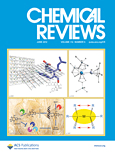
CHEMICAL REVIEWS
Unveiling the Secrets of Chemistry, One Review at a Time.Chemical Reviews, published by the American Chemical Society, is a leading journal in the field of chemistry, renowned for its comprehensive and authoritative reviews on a wide range of chemical topics. With its ISSN 0009-2665 and E-ISSN 1520-6890, this prestigious journal has maintained a remarkable trajectory since its inception in 1924, continuously contributing to advancements in the chemical sciences. As a Q1 journal in the Chemistry (miscellaneous) category, it stands at the forefront of research, boasting an impressive Scopus rank of #1 out of 408 in the field of General Chemistry, positioning it within the top 1% of the field. Chemical Reviews offers invaluable insights and serves as a critical resource for researchers, professionals, and students alike, facilitating knowledge exchange and fostering innovation in chemistry. While currently not open access, it remains a vital component of the scientific community, gathering an extensive readership base eager for the latest developments, methodologies, and theoretical frameworks in this dynamic discipline.
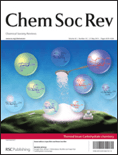
CHEMICAL SOCIETY REVIEWS
Advancing Chemistry Through Comprehensive ReviewsCHEMICAL SOCIETY REVIEWS, published by the Royal Society of Chemistry, serves as an essential platform for researchers, professionals, and students in the field of chemistry. Since its inception in 1972, this prestigious journal has maintained its status as a leading publication, currently positioned in the Q1 category for Chemistry (miscellaneous) and ranking #2 out of 408 journals in the field of General Chemistry on Scopus, with an impressive 99th percentile recognition. With a focus on comprehensive reviews that synthesize key advancements and methodologies, it promotes open discussion and critical analysis crucial for driving innovation within the discipline. Although it operates under a subscription model, the journal strives to foster knowledge dissemination among the global chemistry community, ensuring accessibility to cutting-edge research and insights that shape the future of chemical sciences through its extensive array of articles.

Frontiers in Chemistry
Catalyzing Breakthroughs Across Chemistry Disciplines.Frontiers in Chemistry is an esteemed and innovative Open Access journal published by FRONTIERS MEDIA SA, based in Lausanne, Switzerland. Since its inception in 2013, the journal has established itself as a leading platform for the dissemination of high-quality research across a broad spectrum of chemistry disciplines, achieving a notable Q1 classification in the miscellaneous chemistry category as of 2023. With an impressive Scopus rank, placing it at 72nd out of 408 in General Chemistry and falling within the 82nd percentile, Frontiers in Chemistry is committed to publishing significant findings that contribute to the advancement of the field. The journal's Open Access model ensures that research is freely accessible to all, fostering a greater exchange of knowledge and collaboration among researchers, professionals, and students globally. It covers a range of topics, from organic and inorganic chemistry to materials science and biochemistry, making it an essential resource for anyone seeking to stay at the forefront of chemical research.

CHINESE JOURNAL OF CHEMISTRY
Unveiling the complexities of chemistry since 1990.The CHINESE JOURNAL OF CHEMISTRY, published by WILEY-V C H VERLAG GMBH, is a distinguished peer-reviewed journal that has been contributing to the field of chemistry since its inception in 1990. With an impressive Q1 ranking in the Chemistry (miscellaneous) category and a Scopus rank of 67 out of 408, this journal is recognized for its rigorous scholarly standards and significant impact within the academic community. Renowned for publishing high-quality research, reviews, and insightful commentaries, the journal serves as a vital resource for researchers, professionals, and students keen on advancing their understanding of general chemistry and its applications. Although it does not offer open access, the journal remains an essential outlet for innovative chemistry research, attracting contributions from a global network of specialists. With its broad scope covering various aspects of chemistry and a commitment to fostering scientific dialogue, the CHINESE JOURNAL OF CHEMISTRY is poised to continue its role as a central pillar in the ever-evolving landscape of chemical sciences.
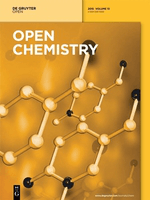
Open Chemistry
Catalyzing Progress in Chemistry and Materials ScienceOpen Chemistry, published by DE GRUYTER POLAND SP Z O O, is a distinguished peer-reviewed journal that has been serving the global chemistry community since its inception. With an ISSN of 2391-5420 and an E-ISSN also of 2391-5420, this open-access journal has been accessible to researchers and practitioners alike since 2015, ensuring a wide dissemination of high-quality research findings. Located in Germany, specifically at BOGUMILA ZUGA 32A STR, 01-811 WARSAW, MAZOVIA, POLAND, Open Chemistry aims to publish innovative research across various chemical disciplines, with special attention to miscellaneous chemistry and materials chemistry. It is currently ranked in the Q3 category for both fields as of 2023, reflecting its solid standing within the academic community, with specific ranks of 187/408 in General Chemistry and 153/317 in Materials Chemistry, corresponding to respective percentiles of 54 and 51. Open Chemistry not only enhances the accessibility of cutting-edge research but also serves as a vital resource for students, professionals, and scholars seeking to advance their knowledge in the rapidly evolving landscape of chemical sciences.

Journal of the Mexican Chemical Society
Pioneering Research for a Sustainable Chemical FutureWelcome to the Journal of the Mexican Chemical Society, an essential publication for researchers and professionals in the field of chemistry. Published by the reputable SOC QUIMICA MEXICO, this journal has been a vital platform for sharing innovative research and developments in the field since its inception in 2008. With an ISSN of 1870-249X and an E-ISSN of 1665-9686, the journal provides valuable insights and contributes to the global scientific community. As of 2023, it holds a Q3 quartile ranking in miscellaneous chemistry categories and ranks #258 out of 408 in General Chemistry on Scopus, placing it at the 36th percentile among its peers. Although currently not an open access journal, it remains committed to disseminating high-quality research that supports advancements in chemical education, practice, and technology. Researchers, academics, and students are encouraged to engage with this journal to explore groundbreaking studies and enhance their understanding of diverse chemical disciplines.
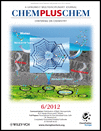
ChemPlusChem
Empowering Scientists with Open Access to Cutting-Edge ResearchChemPlusChem is a premier journal published by WILEY-V C H VERLAG GMBH, dedicated to the vibrant field of chemistry. With an ISSN of 2192-6506 and an impressive Q1 ranking in Scopus's 2023 category for miscellaneous chemistry, this journal serves as a significant platform for the dissemination of high-quality research and innovative findings. Since its inception in 2012, ChemPlusChem has fostered interdisciplinary collaborations, encapsulating a wide array of topics within chemistry that facilitate scientific advancement and education. The journal features a robust open access system, enabling extensive visibility for authors while providing easy-to-access resources for researchers, professionals, and students globally. Located in Weinheim, Germany, ChemPlusChem reflects international standards and ambitions, striving to enrich the global scientific community through rigorous research and engaging scientific discourse.
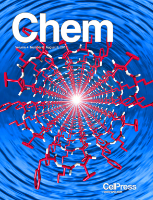
Chem
Exploring the Depths of Biochemistry and BeyondChem, published by CELL PRESS, is a renowned academic journal that has rapidly established itself as a leading platform for cutting-edge research in diverse areas such as biochemistry, chemical engineering, materials chemistry, and environmental chemistry. Released under the ISSN 2451-9294, this esteemed journal has achieved an impressive Q1 category ranking across multiple disciplines in 2023, highlighting its significant impact and prominence within the academic community. With a strong focus on innovative studies and interdisciplinary approaches, Chem fosters a vibrant dialogue among researchers, professionals, and students, making it an indispensable resource for those seeking to advance their knowledge and contribute to the evolving field of chemistry. As an open access journal, it aims to democratize knowledge, ensuring that critical research is accessible to a global audience. With its headquarters based in Cambridge, MA, it continues to lead the charge in the dissemination of pivotal findings that shape our understanding of chemical sciences.

Trends in Chemistry
Redefining the Landscape of Chemical KnowledgeTrends in Chemistry, published by CELL PRESS, stands at the forefront of the multidisciplinary field of chemistry, offering cutting-edge research and insights that shape contemporary scientific discourse. With its impressive rank of #12 out of 408 in the General Chemistry category of Scopus—placing it in the 97th percentile—this journal represents the pinnacle of academic excellence and innovation. Since its inception in 2019, it has provided a platform for sharing pivotal developments and trends in the chemical sciences, making it an invaluable resource for researchers, professionals, and students alike. Although it operates under subscription access, Trends in Chemistry is dedicated to expanding the frontiers of knowledge and fostering a vibrant academic community. Its Q1 quartile ranking underscores its significance and authority in the field, ensuring that it remains an essential reference point for anyone engaged in the ever-evolving world of chemistry. With its impactful contributions, Trends in Chemistry not only reflects current advancements but also drives future innovation in the discipline.